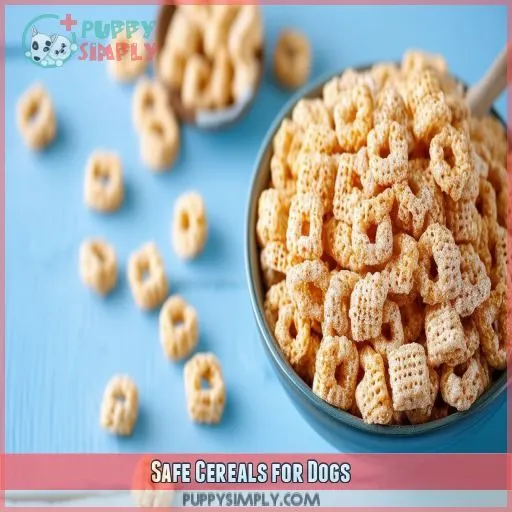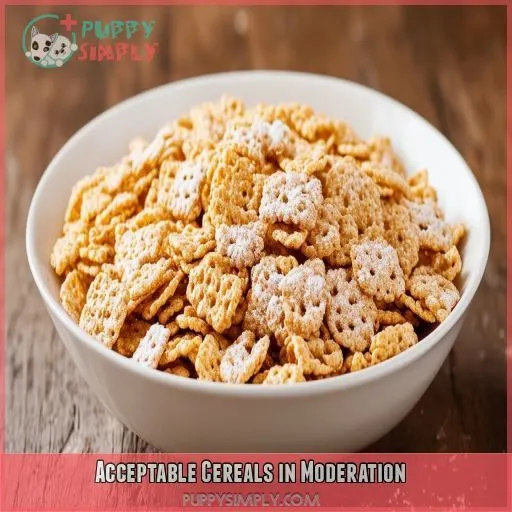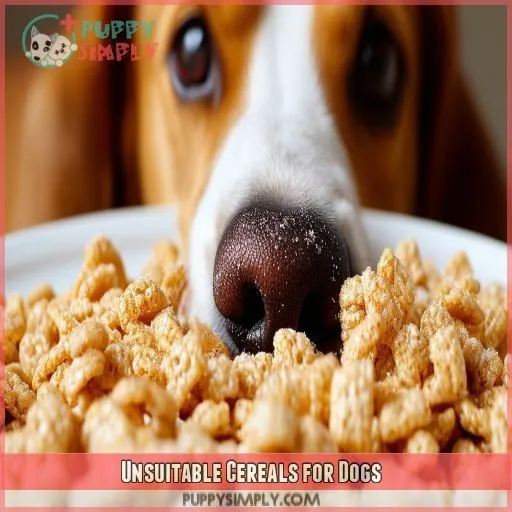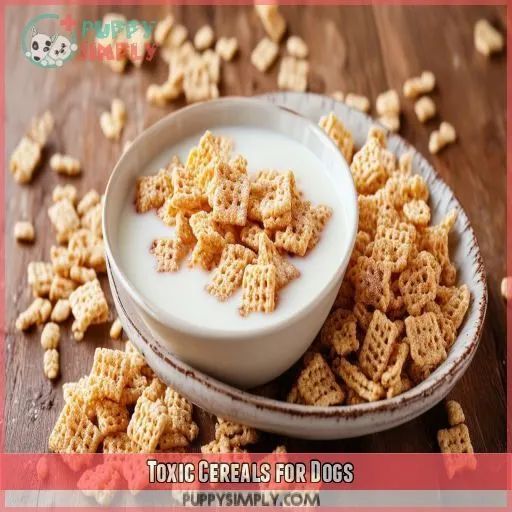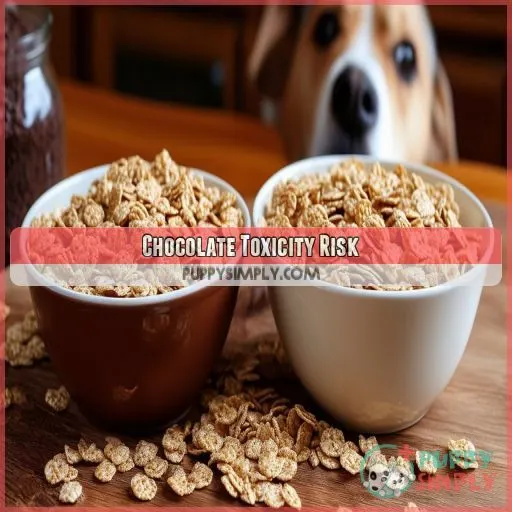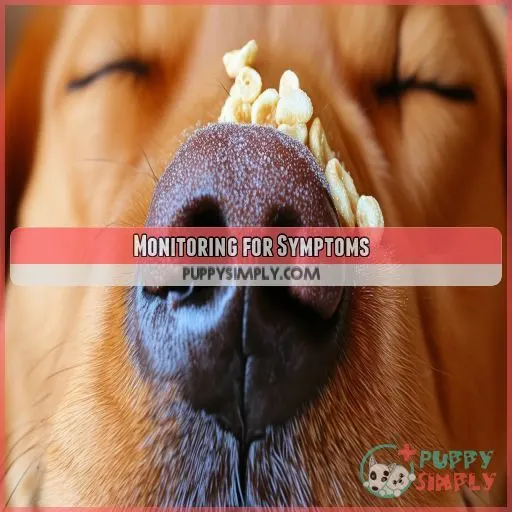This site is supported by our readers. We may earn a commission, at no cost to you, if you purchase through links.
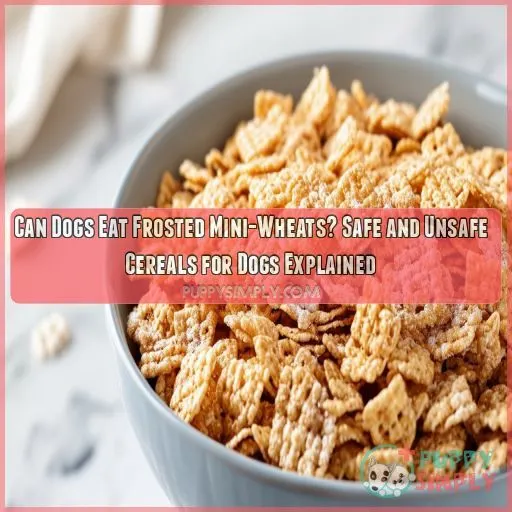 Imagine sitting down to a bowl of Frosted Mini-Wheats, only to be met with those pleading eyes from your dog. Can dogs eat Frosted Mini-Wheats? While a small amount wouldn’t do any harm, this isn’t the best cereal for your dog. It’s filled with sugar and other ingredients that just won’t help your dog at all.
Imagine sitting down to a bowl of Frosted Mini-Wheats, only to be met with those pleading eyes from your dog. Can dogs eat Frosted Mini-Wheats? While a small amount wouldn’t do any harm, this isn’t the best cereal for your dog. It’s filled with sugar and other ingredients that just won’t help your dog at all.
Knowing the safe cereals can help you make better choices in your dog’s diet. It is explained in detail the safe, acceptable, unsuitable, and toxic cereals for dogs so that your pet’s health can be kept secure.
Table Of Contents
- Key Takeaways
- Can Dogs Eat Frosted Mini Wheats?
- Can Dogs Eat Frosted Mini-Wheats?
- Safe Cereals for Dogs
- Acceptable Cereals in Moderation
- Unsuitable Cereals for Dogs
- Toxic Cereals for Dogs
- Chocolate Toxicity Risk
- Monitoring for Symptoms
- Expert’s Advice
- Healthy Treat Alternatives
- Dietary Recommendations for Dogs
- Frequently Asked Questions (FAQs)
- Are frosted mini wheats okay for dogs?
- Is shredded wheat cereal ok for dogs?
- What cereals are safe for dogs?
- Are frosted mini wheats OK to eat?
- Can dogs eat frosted cereal?
- Does eating Mini Wheats worsen a stomach ache?
- Can dogs eat wheat gluten?
- Are Frosted Mini-Wheats healthy?
- Can Frosted Mini-Wheats cause allergic reactions in dogs?
- How often can dogs eat Frosted Mini-Wheats?
- What is the effect of sugar on dogs?
- Are there any benefits of whole grain wheat for dogs?
- What should I look for in dog-friendly cereals?
- Conclusion
Key Takeaways
- Dogs can nibble on Frosted Mini-Wheats, but don’t make it a habit. They’re like junk food for your pup, high in sugar and low in nutritional value.
- If you’re looking for a cereal treat for your furry friend, opt for healthier choices like Cream of Wheat, Grits, or plain Cheerios. These cereals provide more nutritional bang for your buck and are less likely to upset your dog’s stomach.
- Keep an eye on your dog after they’ve eaten Frosted Mini-Wheats, just in case they experience any digestive issues. If your dog starts vomiting or has diarrhea, call your vet right away.
- Remember, moderation is key when it comes to feeding your dog human food. Too much of anything, even healthy foods, can lead to weight gain and other health problems.
Can Dogs Eat Frosted Mini Wheats?
While this might seem innocuous, it’s best to avoid feeding your dog Frosted Mini-Wheats. The high sugar content in this cereal will give your four-legged companion digestion issues and increase the likelihood of obesity.
It isn’t a sour treat, per se, on its face; it just doesn’t contain any canine nutrition. Instead, go with safer options like Cream of Wheat or plain Cheerios.
Always remember that treats should not replace a well-balanced meal, and consult with your vet before introducing new foods into the mix for your dog.
Want more advice on dog-friendly cereals? Gotcha.
Can Dogs Eat Frosted Mini-Wheats?
Frosted Mini-Wheats aren’t toxic to dogs, but they’re not ideal. The sugar content and high carbohydrate levels can impact your pet’s nutrition negatively. While a few pieces now and then won’t harm them, don’t make it a habit.
They lack essential nutrients and could contribute to weight gain or dental issues because of the sugar. Always prioritize healthier cereal alternatives to support your dog’s overall health and well-being. Keep an eye out for any potential health risks when offering such treats.
Safe Cereals for Dogs
Now, the cereals known to be safe for dogs are Cream of Wheat, Grits, Oat Bran, and Cheerios. These many types of cereals don’t bear harmful ingredients them and hence are pretty safe during occasional treats.
Cream of Wheat
While Frosted Mini-Wheats can be an occasional treat, Cream of Wheat stands out for its nutritional value. It’s safer for your dog, offering essential vitamins and fiber. Make sure it’s plain, without added salt or sugar, to maintain its health benefits.
Grits
Grits are safe for dogs, including Bob, to have occasionally. They’ve very little sugar and salt; hence, they can be pretty good as a treat. Just make sure you feed it plain, with neither butter nor seasonings.
Oat Bran
Moving from grits, oat bran offers your dog excellent nutritional value, particularly fiber content which aids in digestive health. Plus, it’s a whole grain. Be cautious of:
- Possible allergies
- Avoiding added ingredients like raisins or cocoa
- Moderation in portions
Cheerios
Cheerios are a safe cereal for dogs due to their low sugar content and vitamin fortification. They offer a good fiber source and have a low glycemic index. However, keep portion sizes small to avoid excessive serving sizes.
| Nutrient | Amount per Serving | Benefit |
|---|---|---|
| Fiber | 3 g | Aids digestion |
| Sugar | 1 g | Low in sugar |
| Vitamins | Various | Nutritional boost |
Acceptable Cereals in Moderation
When considering cereals for your dog, some options are acceptable in moderation, such as Honey Nut Cheerios, Kix, Rice Krispies, and Weetabix. These cereals can be given occasionally but shouldn’t replace a balanced diet.
Honey Nut Cheerios
Honey Nut Cheerios can be given to dogs in moderation. While they’ve better nutritional value than many cereals, their sugar content requires careful portion control, especially given your dog’s size. Opt for alternative treats with less sugar for regular snacks.
Kix
Kix can be a decent dog treat if given in moderation. These cereal balls are simply made from whole grain corn, offering some nutritional value. However, always check the ingredients and remember, treats should complement a balanced diet, not replace it.
Rice Krispies
Rice Krispies are also safe for dogs as an occasional treat because they hold very little sugar and are just made from some simple, safe grains. They contain some nutritional value, and it’s always important to remember the portion size so your dog won’t experience an upset stomach or other problems.
Weetabix
Weetabix is another cereal that dogs can enjoy in moderation. It’s made from whole grains and doesn’t contain harmful ingredients, but it’s still important to keep portion sizes small. Always be mindful of potential risks like digestive upset from overconsumption.
Unsuitable Cereals for Dogs
When choosing cereals for your dog, keep in mind that Apple Jacks, Bran Flakes, Cinnamon Toast Crunch, Corn Flakes, and Froot Loops are unsuitable due to their high sugar and potential harmful ingredients. While they may not be toxic, they can contribute to stomach upset and poor nutrition.
Apple Jacks
Apple Jacks aren’t suitable for dogs due to allergy concerns, high sugar content, and artificial flavorings. This cereal doesn’t offer much nutritional value for your pup and may upset their stomach with its low fiber intake.
Bran Flakes
Bran flakes, though rich in fiber and whole grains, aren’t great for dogs. They contain high gluten content and other ingredients that might upset your dog’s digestion. It’s best to avoid feeding them to your pup.
- High fiber content
- Contains whole grains
- High gluten level
- Potential digestive upset
- Not recommended for dogs
Cinnamon Toast Crunch
Cinnamon Toast Crunch is unsuitable for dogs due to its cinnamon flavoring, additives, and high sugar content. These ingredients can lead to digestive issues and aren’t safe. Avoid sharing this cereal with your furry friend.
Corn Flakes
Corn Flakes aren’t suitable for dogs due to:
- High sugar content – can lead to weight gain and dental problems.
- Grain sensitivities – can cause stomach upset.
- Choking hazard – large flakes can be difficult to chew.
Froot Loops
| Froot Loops, with their vibrant hues and sugary allure, may tempt your pup, but they’re an unsuitable choice. (Source) Artificial colors, flavors, and high sugar content make Froot Loops a nutritional pitfall for canine companions. (Source) | Ingredient | Concern |
|---|---|---|
| Artificial Colors | Linked to behavioral issues and allergies | |
| Artificial Flavors | Disrupt normal digestion and metabolism | |
| Sugar | Leads to weight gain, diabetes, and dental issues |
Consult your vet for healthy, dog-friendly treats instead. (Source)
Toxic Cereals for Dogs
Certain cereals, like Cocoa Puffs, Raisin Bran, and Reese’s Puffs, pose significant health risks for dogs due to their toxic ingredients. Avoid these cereals to prevent ingestion of harmful substances such as cocoa and raisins.
Cocoa Puffs
Within the "Toxic Cereals for Dogs" category fall the Cocoa Puffs because of harmful ingredients:
- Cocoa: This contains theobromine, which is toxic in dogs.
- Sugar: The number one cause of obesity and dental diseases.
- Artificial Flavors: may be sensitizing.
- Preservatives: These can be harmful to pet health.
Keep clear of cereals containing cocoa for pet safety.
Raisin Bran
Raisin Bran is toxic for dogs due to raisin toxicity. Bran flakes themselves aren’t ideal either. Raisins can cause kidney failure, posing a serious threat. Always check ingredients to avoid harmful foods. Choose healthier cereals or treats with safer ingredients instead.
| Ingredient | Raisin Bran | Frosted Mini-Wheats |
|---|---|---|
| Cocoa | No | No |
| Raisins | Yes | No |
| High Sugar Content | Yes | Yes |
Reese’s Puffs
Reese’s Puffs are toxic for dogs, thanks to their peanut butter, artificial flavors, milk chocolate, and high sugar content. Even a small serving can be harmful. Be aware of these risks:
- Upset stomach
- Vomiting
- Diarrhea
- Possible long-term health issues
Always opt for healthier alternatives to keep your furry friend safe and happy.
Chocolate Toxicity Risk
Sensitivity to chocolate varies in dogs, and some breeds are more sensitive to its effects.
Due to the minimal amount he ingested, the risk of severe chocolate toxicity is low.
However, one can never be cautious enough in this regard.
Monitoring can be done according to the guidelines below, looking out for some stomach upset.
You’re now tasked with keeping Bob safe while you seek other items to substitute as treats in the future.
Keep all things that have chocolate far from their reach.
Monitoring for Symptoms
When monitoring for symptoms after your dog eats Frosted Mini-Wheats, watch for signs of stomach upset like vomiting or diarrhea. Also, keep an eye out for lethargy, as this can indicate a more serious issue.
Observing Stomach Upset
Ensure you’re monitoring signs of digestive upset in your dog. Keep an eye out for:
- Refusal of food
- Excessive drooling
- Uneasiness or whining
These are likely to include signs indicative of a potential upset stomach. If your dog is showing any of these, consult a vet for advice on how best to ensure the health and well-being of your pet.
Recognizing Diarrhea Signs
Observe the duration, frequency, regularity, color, and odor of stools. A persistent, frequent, watery, unusually colored, or foul-smelling diarrhea may point to a problem. Sometimes, loose stool is nothing to worry about, but dramatic changes are. Early recognition of some conditions avoids potential jeopardy and discomfort for Bob.
Detecting Lethargy Symptoms
Lethargy in dogs imitates the state of fatigue. You’ll probably find your dog unusually lethargic or weak, excessively sleeping or hesitant to move, or showing less interest in toys and games. If Bob’s sluggishness persists or worsens, it’s time to contact your vet to ensure he’s all right and rule out further complications.
Expert’s Advice
Experts advise staying calm if your dog has ingested Frosted Mini-Wheats. Considering the sugar content and carbohydrate intake, these treat types should only be given sparingly. Here are three key steps:
- Monitor Frequently: Watch for any signs of upset stomach, vomiting, or diarrhea.
- Seek Veterinary Consultation: If symptoms appear, consult your vet promptly.
- Limit Future Intake: Avoid cereals with high sugar or unsuitable ingredients for dogs to prevent health issues.
Healthy Treat Alternatives
Before you worry about which cereals are safe, consider healthier treat alternatives that provide your dog with a balanced diet. Offering treats rich in lean protein can support their health better than sugary cereals. Here are some options to keep your furry friend happy:
- Cooked Chicken: Shredded or diced, it’s a tasty, low-fat protein source.
- Carrot Sticks: Crunchy and full of vitamins, perfect for a quick snack.
- Apple Slices: Remember to remove seeds and core, a sweet, fiber-rich treat.
Dietary Recommendations for Dogs
When choosing treats for your dog, focus on nutritional balance. Opt for low sugar content and measure the serving size carefully. Treats shouldn’t replace meals and should be infrequent.
Frosted Mini-Wheats, while safe, should be given sparingly due to their high sugar levels. Always consider your dog’s overall diet and consult with a vet before introducing new foods.
Frequently Asked Questions (FAQs)
Are frosted mini wheats okay for dogs?
Frosted Mini Wheats are safe for dogs in moderation, but aren’t ideal due to their high sugar and carb content. They can be given as occasional treats, but don’t make them a regular part of your dog’s diet.
Is shredded wheat cereal ok for dogs?
Shredded wheat cereal? Sure, it’s safe for dogs—if you ignore the fact that it’s basically cardboard. Just keep it plain, no sugar or additives. Remember, moderation is key; it’s not their ideal diet.
What cereals are safe for dogs?
Safe cereals for dogs include Cream of Wheat, Frosted Mini Wheats, Grits, Oat Bran, and Cheerios. In moderation, Honey Nut Cheerios, Kix, Rice Krispies, and Weetabix are also suitable. Avoid cocoa and raisin-containing cereals.
Are frosted mini wheats OK to eat?
Frosted Mini Wheats are generally safe for dogs but should be given only occasionally due to their high sugar and carbohydrate content. They lack nutritional balance for dogs and can cause stomach upset if overfed.
Can dogs eat frosted cereal?
Dogs can eat frosted cereal in moderation, but it’s not ideal. The high sugar content and lack of essential nutrients make it an occasional treat rather than a regular part of their diet to maintain health.
Does eating Mini Wheats worsen a stomach ache?
Did you know Frosted Mini-Wheats contain 12 grams of sugar per 25 pieces? Consuming these can worsen a dog’s stomach ache due to high sugar content and carbohydrates, leading to potential digestive discomfort.
Can dogs eat wheat gluten?
Yes, dogs can eat small amounts of wheat gluten. However, it shouldn’t form a significant part of their diet because dogs also need a balanced diet. Observe allergies or the emergence of digestive disorders while introducing new foods to them.
Are Frosted Mini-Wheats healthy?
Frosted Mini-Wheats aren’t considered healthy because they’re high in sugar and carbohydrates. While they’re okay as a treat in moderation, they’re not suitable for a balanced diet due to their nutritional imbalance.
Can Frosted Mini-Wheats cause allergic reactions in dogs?
While Frosted Mini-Wheats aren’t toxic to dogs, there’s a chance your dog might’ve an allergic reaction. Always watch for symptoms like itching, swelling, or gastrointestinal upset when trying new foods. Monitor carefully.
How often can dogs eat Frosted Mini-Wheats?
Dogs can have Frosted Mini-Wheats occasionally as a treat, but only in small amounts. Due to their high sugar content, they shouldn’t be a regular part of your dog’s diet to avoid health issues.
What is the effect of sugar on dogs?
While dogs can enjoy the occasional Frosted Mini-Wheats as a treat, the high sugar content isn’t ideal for their health. Too much sugar can lead to weight gain, dental issues, and other problems. Moderation is key when feeding your pup people food.
Are there any benefits of whole grain wheat for dogs?
Whole grain wheat offers dogs dietary fiber, aiding digestion and bowel health. It provides essential vitamins and minerals, supporting overall well-being. However, it should be given in moderation, as part of a balanced diet.
What should I look for in dog-friendly cereals?
Look for cereals that are low in sugar and fat, free from dangerous ingredients like chocolate and raisins, and high in whole grains. Always choose options safe for dogs and offer them only as occasional treats.
Conclusion
While the urge to feed your dog Frosted Mini-Wheats may tempt you, it’s best to opt for other cereals that are safer and more appropriate.
Good examples of healthy cereals that can be fed to dogs include Cream of Wheat, Oat Bran, and plain Cheerios. Ignore those loaded with sugar or toxic compounds like chocolate or raisins.
Keep a watch on his health and take the advice of your vet on diet.

